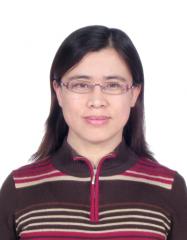Dr. Haiyan Geng is a professor at the Department of Psychology, Peking University. She got Ph. D in 1998 at Peking University. Her current research is focused on Cognitive and neural mechanisms of conscious and unconscious processes. She also studies false memory and its underlying neural mechanisms. She’s in charge of four projects supported by National Natural Science Foundations of China.
List of Publications
Zhou, S. #, Xu, Y. #, Wang, N., Zhang, S., Geng, H.*, Jia, H.*(2020) Deficits of subliminal self-face processing in schizophrenia. Consciousness and Cognition, 79:102896.
Wang, N. #, Xu, S. #, Zhang, S., Luo Y. & Geng, H.*(2019) ERP evidence on how gaze convergence affects social attention. Scientific Reports, 9:7586.
Xu, S., Zhang, S., and Geng, H.* (2018). The effect of eye contact is contingent on visual awareness. Frontiers in Psychology, 9:93.
Yuan, X., Wang, N., Geng, H.* and Zhang, S. (2017) Mentalizing Another’s Visual World—A Novel Exploration via Motion Aftereffect. Frontier in Psychology 8:1535.
Zhang, F., Zhang, X., Luo, M. and Geng, H.* (2016) The Effects of Feedback on Memory Strategies of Younger and Older Adults. PLoS ONE 11(12): e0168896.
Luo, Y., Zhang, S., Tao, R., Geng, H.* (2016). The Power of Subliminal and Supraliminal Eye Contact on Social Decision Making: An Individual-Difference Perspective. Consciousness and Cognition, Consciousness and Cognition 40: 131–140.
Cui G, Zhang S, Geng H.* (2014) The Impact of Perceived Social Power and Dangerous Context on Social Attention. PLoS ONE 9(12): e114077. doi: 10.1371/journal.pone.0114077
Luo M, Geng H Y.*(2013). How can survival processing improve memory encoding? Sci China Life Sci, 56: 1028–1037.
Tao R., Zhang S., Li Q., Geng H.* (2012). Modulation of Self-Esteem in Self- and Other-Evaluations Primed by Subliminal and Supraliminal Faces. PLoS ONE 7(10): e47103. doi:10.1371/journal.pone.0047103.
Geng, H.*, Zhang, S., Li, Q., Tao, R. & Xu, S. (2012). Dissociations of Subliminal and Supraliminal Self-Face from Other-Face Processing: Behavioral and ERP Evidence. Neuropsychologia, 50: 2933–2942.
Geng, H.Y. & Xu, S. (2011). Unconscious Self-Processing: subconscious, unintentional or subliminal?”. In Han, S., & Pöppel, E. (Eds.). Culture and Neural Frames of Cognition and Communication (On Thinking). pp 93-107, Berlin: Springer.
Xu, S., zhang, S. & Geng, H.Y.*(2011) Gaze-induced joint attention persists under high perceptual load and does not depend on awareness. Vision Research, 51: 2048–2056.
Zhang F & Geng H Y*. What can false memory tell us about memory impairments in Alzheimer’s disease? Chinese Science Bulletin, 2010, 55 (35): 3989-3997.
Wang M, Geng H Y.* The adaptive characteristics of memory: A perspective from the life-span development of associative memory illusion. Chinese Science Bulletin, 2010, 55(16): 1581−1589.
Li, Q. & Geng, H.* (2009). Progress in cognitive neuroscientific studies of visual awareness. Progress in Natural science, 19(2):145-152.
Geng, H. Y., Qi, Y. Q., Li, Y. F., Fan, S. L., Wu, Y. H., & Zhu, Y. Neurophysiological correlates of memory illusion in both encoding and retrieval Phases. Brain Research, 1136(2007):154-168
Geng Haiyan, Song Qianlan, Li Yunfeng, Xu Shan & Zhu Ying. Attentional Modulation of Motion-Induced Blindness. Chinese Science Bulletin, 2007, 52 (8): 1063-1070.
Geng H Y, Song Q L, Li Y F, Zhu Y. (2005). The effect of attention to distractor on inhibitory processes in selective attention. Chinese Science Bulletin, 2005, 50(16): 1743-1750.
Wu, Y.H. Geng, H.Y. &Zhu,Y. (2003). What We Learn From Cognitive Neuroscience?. Acta Psychologica Sinica, 2003, 35 (增): 1-5.
Geng H. Y., Qi Y. Q., Cai W. J., He Z. J. Li L.(2004). False memory of human faces. The 28th International Congress of Psychology (ICP2004), August 8-13, Beijing China.
Geng H. Y., Li Y. F., Fan S. L. Zhu Y. (2004). Perception With and Without Awareness: an ERP study. ASSC8 (Association for the scientific study of consciousness: The 8th annual meeting), June 25- 28, University of Antwerp, Antwerp, Belgium.
Geng H. Y. & Zhu Y.(2001).Perception Without vs. With Awareness: Typical and Reversed Stroop Effect. The Third International Conference On Cognitive Science, Aug. 26-31, Beijing(China). Oral presentation in Symposium11: High-level Cognition: Theoretical Issues and Applications.
Geng, H. Y. and Zhu Y. (2000). Unconscious perception: Trade-offs Between Attention and Stimulus quality. Proceedings of ASSC4. Consciousness and Cognition, 9(2), s68.
Geng H. Y. and Zhu Y. (2000). Perception Without Awareness: Consciousness, Attention and Stimulus Quality. XXVII International Congress of Psychology. International Journal of Psychology, volume 35(3/4), p453.
